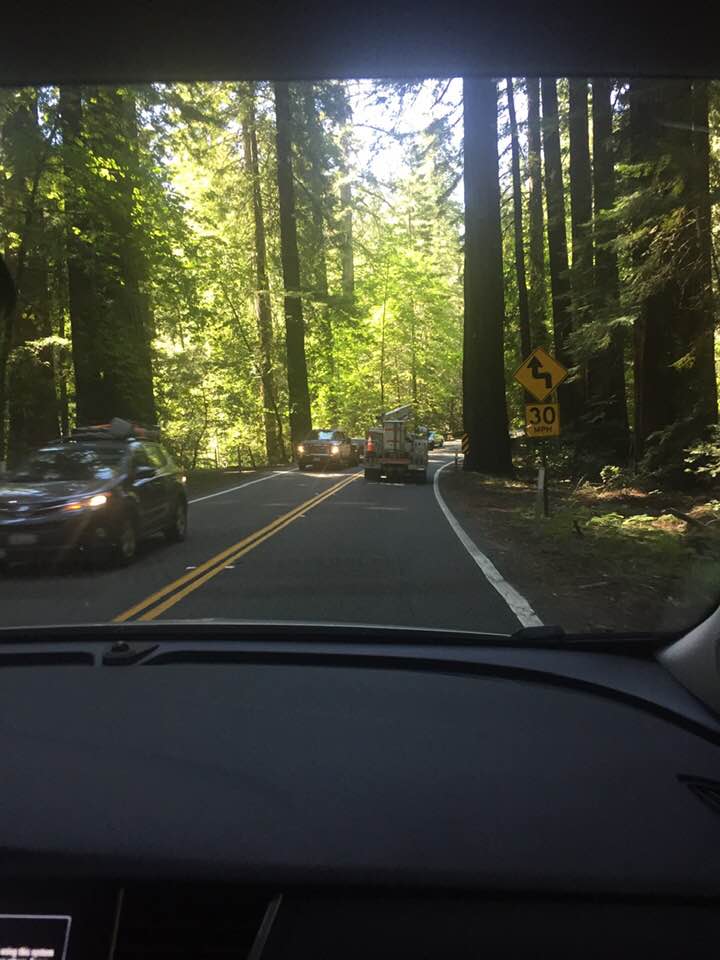
The Next Day
The day after the post from June 26th, 2019, I got a call that turned the world upside down.
The next day
I had just finished a glass of wine after work, when I got a call. The woman on the other end of the phone asked me if I was Darlene Pawlik. Assuming a scam or solicitation, I asked who she was. “A nurse in the emergency department,” she said. “How do I know who you are?” I said as I began to hear my daughter yelling in pain, “It hurts so bad!” asking for someone to help.
My daughter had been run over by the RV her boyfriend was driving. Between gasps, she said, “Call my ex-husband and come get the kids.” She has two children. Immediately, I called her ex-husband and he made arrangements to travel 3,000 miles to where she was. I slept two hours and left the place where I had been staying, then picked him up at 3:30am and drove to the airport. I left my car without a clue of how long we’d be gone or how much it would cost. We tried to rest on the plane. He and I were not seated near one another.
When we got to California, from the east coast, we met and got a rental car. He drove this time. It was a five and a half hour trip. He talked of how much he had grown as a person and I tried to stay focused. Upon arrival, my daughter, who had not seen herself in a mirror after the trauma, nor had she considered her appearance, wanted her children to know she was alive. They were right behind me. I had 20-30 seconds to intervene. The hospital had placed her in a double occupancy room. When I passed the curtain and saw her, I realized that the kids would see her too.
Blown out eyes
Her eyes were bulged out like a toy that you squeeze and the pressure pushes the eyes out like nothing else. They were bleeding and sitting out on top of the sockets from the pressure of the 11,000 pound camper parked on her abdomen. I quickly wiped the blood from her cheeks and tried to catch my breath as they came in closer. The elder, a girl, ten years old, looked at her mom and immediately turned and thrust her face into my chest, Her son, trying to be brave, looked at her with a stare of utter disbelief that could only be attributable to his exposure to fantasy games. He stared.
Their father took them from the hospital to dinner at a restaurant that did not cater to children. They were faced with food they didn’t like or hunger. They chose the former. Neither of the children were dressed for the 50* coastal weather. But they posed, as expected, for photos. Poses from yoga expressing serenity and peace were posted to social media. The feelings or observations of the children set aside. My heart was broken for them. But I had to pay attention to my daughter.
Writhing in pain
In Eureka, the doctors seemed to have no clue about what was happening or how to deal with it. My daughter’s abdomen was crushed, the RV had rested on her abdomen for about a minute, while her boyfriend walked around the vehicle and got back into the driver’s seat to drive it off of her. I have photos. One doctor thought her pancreatitis was caused by drinking. There were tire tracks on her abdomen, though…
The RV was parked directly outside the window of her room. All I saw was her bent over in pain, rocking back and forth, hung over the walker or the edge of the bed with her back up trying to relieve the pressure and pain. Her abdomen swelling more each day and the bruising from head to toe getting brighter. She swelled up and had trouble voiding. I had to corner a nurse to ask what the protocol was for addressing it. She had eleven broken ribs, abrasions and contusions all over. Her liver was lacerated, her kidney too. They told her she couldn’t eat for a whole day. Then, they gave her broccoli and beef, foods hard to digest. Then, nothing again for 36 or 48 hours. She was bleeding with every bowel movement and each void, but they kept her without intervention.
Night and day, she writhed in pain constantly, barely resting with heavy sedation. She literally cried out that she was dying frequently. The pain was overwhelming. She ran a shower over her abdomen night and day. Between the regular noise and activity of the hospital and the horrendous pain she didn’t sleep at all. Monitors tracked her vital signs. Her heart rate was recorded in the 130s to 150s. Even so, her cries were barely acknowledged by some.
No place to go
She spent 9 days in these hellish conditions. The surgeon thought she could leave in a couple days, just waking around the RV that ran her over every two hours. Just how long would it take to get to North Carolina from Eureka, CA with an RV stopping every two hours for a person who had had their abdomen crushed by the same RV to walk around the vehicle twice using a walker, because their strength was depleted? (Maddening)
The doctors did not meet, they ordered tests or drugs, then another would change the order. It was chaos. Dark chaos. Night or day, the place was terribly oppressive. People wandered the halls crying. Including me.
The social worker gave me a form with the number to call if we felt we were not getting adequate care. No one came. We asked for a second opinion, to which, the other surgeon said, “No” he would not see her. A new doctor came in after 7days. She was incensed and said my daughter should not be there. She ordered a CT scan with contrast. The head surgeon again cancelled it. My daughter was sure she’d die there. She would ask me to sneak her out. We were five hours from the nearest hospital. They changed the unit to a step down of the level of care saying she “looked better every day.”
The roommate
There we were met with a much smaller room filled with extra furniture and equipment. Her new roommate was hard of hearing. Blaring on the TV was Jerry Springer. Screaming and yelling, the roommate complained that she was supposed to be discharged. People were in and out frequently, passing my daughter’s bed while she continued to be in horrible pain. The surgeon came in and loudly ordered me and her boyfriend out. She talked to my daughter about the second opinion request and said she needed to trust her, but she did allow a CT scan. The scan was done and my daughter was moved to a private room at the end of the hall where they sedated her more. I was not sure she would make it out of there alive.
The next day, the surgeon came into the room and told my daughter that the scan came back with the proof that her pancreas was broken, spilling digestive enzymes into her gut. She would die without transport to a level 1 trauma center. Arrangements were made for her to be flown to another hospital. “We are a trauma hospital,” the surgeon told me in a snide voice, “Our’s is level three trauma. She will go to a level one trauma unit.”
This doctor had complained to the nursing staff that the family insisted on a ct scan. Then, when it cam back she said, “It’s a good thing you agreed to that scan.” We were to leave that day. I had hope of her living again.
Preserving dignity
During those first nine days, I didn’t eat or sleep much. I did take time to cry. I talked and prayed with my husband and told everyone else to leave me alone and sent updates to him and my eldest child. Designating a contact person was one of the best coping mechanisms at that time. I only had to relay information once. It was intensely painful to watch her suffer. All I could do was ask for help. Which I did, but only a few nurses seemed to care at all. Others would disappear, not give her medicine, not help her to the bathroom. It was torturous for her and so, I tried to meet the need in a way I could.
I literally covered her ass. We have to do that for one another. As humans and as loved ones, people need people more that we want to acknowledge. The physical representation was that her pain was so severe that she could not stay still, but writhed continuously. While, others may not have seen, it was clear that she was unable to stay still for more than a few minutes. I would drape an additional gown or a towel or pull-sheet over her when the position of her body required covering to protect her dignity.
“There is no dignity here,” she said.
Your loved one will need your help to preserve their dignity and their life. Many people will tell you, if you ask, that you need a person with you in a hospital setting. It’s called “practicing medicine” for a reason.



